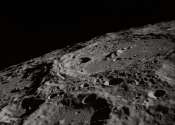Loneliest tree in the world marks new age for our planet
An international research team, including Professor Christopher Fogwill from Keele University, has pinpointed a new geological age, the Anthropocene.
An international research team, including Professor Christopher Fogwill from Keele University, has pinpointed a new geological age, the Anthropocene.
Environment
Feb 19, 2018
0
48

A study led by University of Colorado Boulder researchers provides new insight into the Moon's excessive equatorial bulge, a feature that solidified in place over four billion years ago as the Moon gradually distanced itself ...
Space Exploration
Feb 6, 2018
0
234

New research backing claims that the Earth experienced a 'geological lull' in its development around 2.3 to 2.2 billion years ago has just been released by Curtin University.
Earth Sciences
Jan 30, 2018
11
191

To interpret what we see today both on land and at the seabed, we need to understand how the landscape was different in the past. When we say "past," we mean on a geologic timeframe—specifically, about 10,000 to 20,000 ...
Earth Sciences
Sep 19, 2017
0
8

Climate has influenced the distribution patterns of Adélie penguins across Antarctica for millions of years.
Plants & Animals
Jun 29, 2016
1
375

A new study has found a link between abrupt ocean warming at the end of the last ice age and the sudden onset of low-oxygen, or hypoxic conditions that led to vast marine dead zones.
Earth Sciences
Nov 18, 2015
7
59

The pace of past episodes of climate change is likely to have been underestimated, according to research carried out by scientists at the University of Aberdeen and Friedrich-Alexander University (FAU) in Germany.
Earth Sciences
Nov 10, 2015
69
310

A group of nine PhD students from the Department of Earth and Environmental Sciences at Columbia University has just arrived in Exuma, The Bahamas, for a week-long field trip.
Earth Sciences
Jun 8, 2015
0
25

A new study examines how Earth's oldest iron formations could have been formed before oxygenic photosynthesis played a role in oxidizing iron.
Earth Sciences
Nov 7, 2014
4
0

A new analysis of geologic history may help solve the riddle of the "Cambrian explosion," the rapid diversification of animal life in the fossil record 530 million years ago that has puzzled scientists since the time of Charles ...
Earth Sciences
Oct 31, 2014
8
0